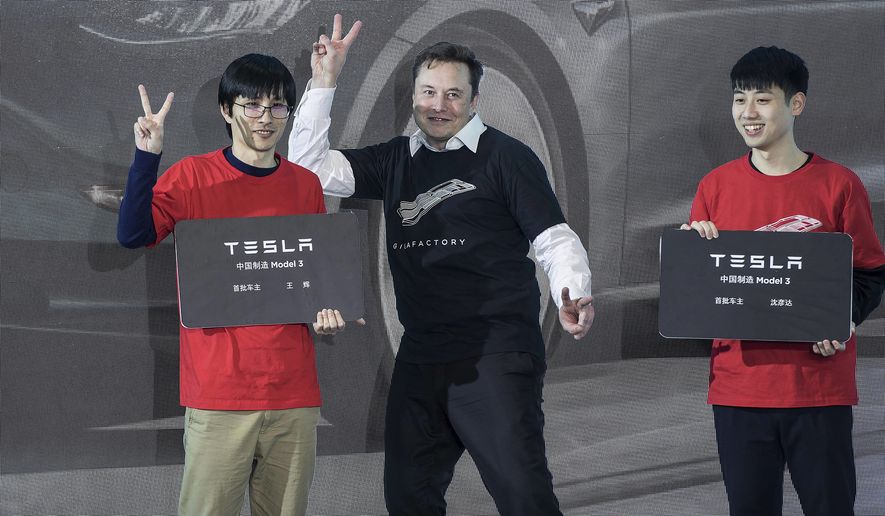OPINION:
Although his deal to buy Twitter is “on hold,” Elon Musk is still committed to the takeover according to himself. So the China questions that are arising from this potential acquisition remain valid.
Ever since Mr. Musk announced his $44 billion purchase of Twitter, reactions have varied considerably. Most conservatives think he will make the space more open to freedom of speech, while many liberals fear the repercussions that can come from Mr. Musk potentially removing all content moderation. However, Amazon’s Jeff Bezos raised a more pressing concern that has flown under both sides of the aisle’s radar thus far: Will Mr. Musk’s ownership of Twitter benefit China at proponents of democracy’s expense?
China has banned Twitter since 2009, but millions of Chinese citizens use proxy servers to bypass the government’s social media restrictions and access news reports that the genocidal regime deems unfavorable. That is partly why over 26,000-linked Twitter accounts have been found to spread regime-backed propaganda on the social media platform — to counter the anti-People’s Republic narratives that Chinese skeptics and their Western allies may see.
Twitter has shut down a significant number of accounts connected to the Chinese Communist Party. That said, with Mr. Musk’s Tesla already dependent on the special treatment that China affords it for profitability, and given Mr. Musk’s rich history of complying with the communist regime’s many demands, will a laxation or outright reversal of policy soon come under order?
Twitter employees have already given Saudi Arabia the email addresses, phone numbers, private messages and other personal information of Saudi critics, while Saudi Crown Prince Mohammed bin Salman controlled under 10% of the company. By comparison, Mr. Musk will soon own 100% of Twitter, and his company relies on China’s business and loans. Then, what is to stop Mr. Musk, under China’s pressure, from tasking a Twitter engine to help China hunt down and attack the Twitter users inside China, where using Twitter is banned and can be criminalized, and the critics of the CCP both in and outside country?
China has ramped up its global disinformation and propaganda efforts, and the country is quite comfortable using its influence to further its political and military ends. It even legally obligates all Chinese entities to spy for the government, a practice codified in China’s National Intelligence Law of 2017. Perhaps that is why Mr. Musk has taken such a starkly different approach to the requests he receives from the Chinese government and that of the United States.
For example, Mr. Musk acted swiftly to recall over 285,000 cars in China over regulators’ concerns over its autopilot feature. However, when U.S. governmental investigative agencies have expressed similar concerns over Tesla’s autopilot technology, he has struck their ire by brushing them off.
When California ordered Mr. Musk to shut down his Tesla factory during the early days of the pandemic, Mr. Musk initially refused in a dramatic public fashion. But when China ordered a Tesla factory to shut down this year for COVID-related concerns, he quietly complied. He has also remarked, “China rocks,” and praised the country’s economy despite routinely deriding the United States, one of the freest nations on earth, for reasons that most would consider petty at best.
Mr. Musk certainly has a lot to gain from staying in China’s good graces and currying more favor with the regime. The country rewrote its rules to allow him to begin operating in the country, which was critical to propelling Tesla to its first year of complete profitability in 2020.
While Mr. Musk initially claimed to be a free speech absolutist, on April 27, he clarified that he would comply with government laws that restrict free speech. Somehow, this does not seem like a comforting position to Chinese dissidents caught under the bloodied red heels of President Xi Jinping’s jackboots.
There is no doubt that China is aware of the possibilities that Mr. Musk’s Twitter acquisition could afford its nation. One can only hope that Mr. Musk will stray away from his tendency to comply with the country’s every beck and call — at least this time. World peace and geopolitical relations are counting on it. After all, we cannot afford to rely on the whim or calculation of one individual, who wants to act like a government, for the necessary protection of free speech or the necessary moderation of speech content, whatever he claims he is, or his intentions are.
• Jianli Yang, a former political prisoner of China and a Tiananmen Square massacre survivor, is founder and president of Citizen Power Initiatives for China and the author of “For Us, The Living: A Journey to Shine the Light on Truth.” Lianchao Han is vice president of Citizen Power Initiatives for China. After the Tiananmen Square massacre in 1989, he was one of the founders of the Independent Federation of Chinese Students and Scholars. He worked in the U.S. Senate for 12 years as a legislative counsel and policy director for three senators.




Please read our comment policy before commenting.